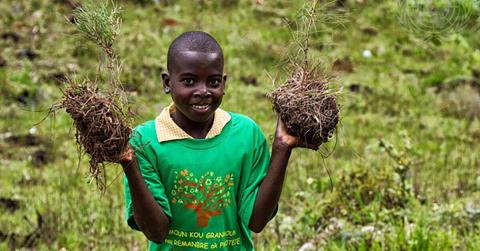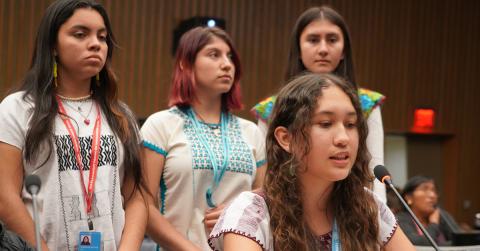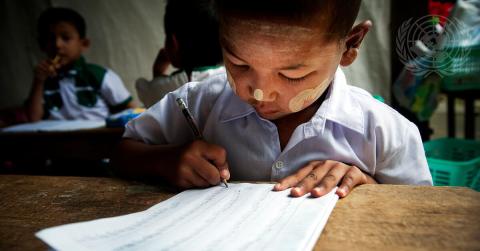Scaling up energy action
A number of events under the umbrella of the SDG7 Action Forum 2023 are taking place during 16-25 September around New York City to help drive momentum on key Energy Compacts, including those promoting no new coal, 24/7 carbon-free energy, electrification of health clinics in energy-poor countries, clean cooking technologies, sustainable water and energy solutions and other important initiatives.
Green skills for youth: Towards a sustainable world
On 12 August, the world will observe International Youth Day. This day celebrates the contributions, ideas, energy and creativity of young people to foster positive change, not only for themselves, but also for their communities and the rest of the world. This year, on International Youth Day, UN DESA is highlighting the importance of green skills in building back better towards a more sustainable future.
Indigenous youth as agents of change
The UN Declaration on the Rights of Indigenous Peoples (UNDRIP) affirms that Indigenous Peoples, including children and youth, have the right to self-determination, and have an equal right to govern themselves, equal to all other peoples. Indigenous youth are playing an increasingly active role in exercising their right to self-determination, working as agents of change at the forefront of some of the most pressing crises facing humanity, as their future depends on the decisions that are made today.
Why geographic location matters for the global goals
We all recognise the need to rescue the SDGs. Our hard-fought development progress is reversing under the combined impacts of climate-related disasters, conflict, economic uncertainties, and lingering effects of the COVID-19 pandemic. We must take urgent action and use every potential opportunity to translate the vision of “leaving no-one behind” into reality. In this regard, we must better leverage geographic location. Geospatial information, data about a geographic location, provide insights that help us map our current course for the better.
Crisis in global learning: a call for action to improve education access, quality, equity and inclusion
Education is one of the best investments societies can make to build a more sustainable and prosperous future. Improvements in learning opportunities contribute directly to the achievement of sustainable development and the promotion of human rights, gender equality and the empowerment of women and girls. Realizing the right to education helps to eradicate poverty and makes individuals and communities more resilient in the face of natural disasters and climate change.
12 special events you can’t miss at the 2023 HLPF
Every year at the High-level Political Forum on Sustainable Development (HLPF), UN DESA, as the secretariat of the Forum, in collaboration with key partners, curates a number of high-profile special events featuring high-level report launches and discussions to galvanize broad ownership and engagement on the SDGs from key sectors, such as higher education institutions, private sector, local and regional governments, parliamentarians, among others.
We look forward to your participation – in person or virtually – at the following 2023 HLPF Special Events:
Raising our voices against gender-based violence in older age
Observed on 15 June, World Elder Abuse Awareness Day (WEAAD) was officially recognized by the United Nations General Assembly in 2011. WEAAD represents the one day in the year when the world raises its voice in opposition to elder abuse and enhances the recognition of the dignity of older persons and their right to live their lives free from fear and violence.
Unlocking sustainable development financing through Integrated National Financing Frameworks (INFFs)
As countries worldwide work towards achieving the Sustainable Development Goals (SDGs) by 2030, financing becomes increasingly vital. In 2015, UN Member States adopted the Addis Ababa Action Agenda and agreed to use Integrated National Financing Frameworks (INFFs) to support nationally owned sustainable development strategies.
Celebrating 20 years of public service innovation for sustainable development and inclusion
For two decades, the United Nations Public Service Awards Programme (UNPSA) has celebrated excellence in public service by recognizing the creative achievements and contributions of public institutions to address the social, economic and environmental needs of society. The annual Awards programme which began in 2003 serves as a prominent platform for highlighting global innovations and best practices in public administration and governance.
Next Global Policy Dialogues aim to turbocharge SDGs under review at HLPF
From the climate crisis to global conflicts to the lingering socioeconomic effects of the pandemic, it is clear that the world is facing major challenges that are setting back hard-earned development progress. It is also clear that we need a revitalization of the Sustainable Development Goals (SDGs) to get us on the best path forward.
 Welcome to the United Nations
Welcome to the United Nations









